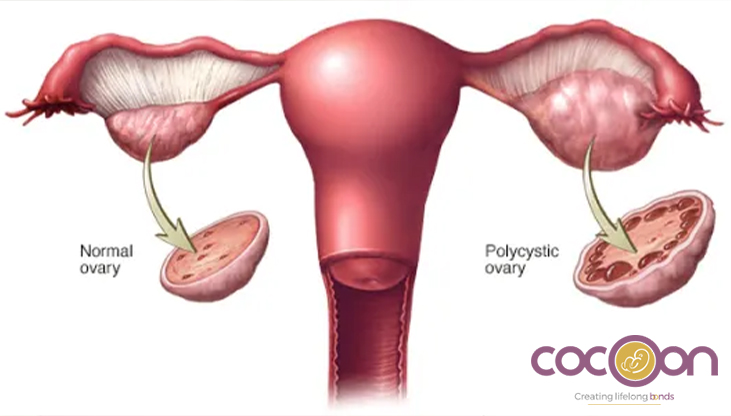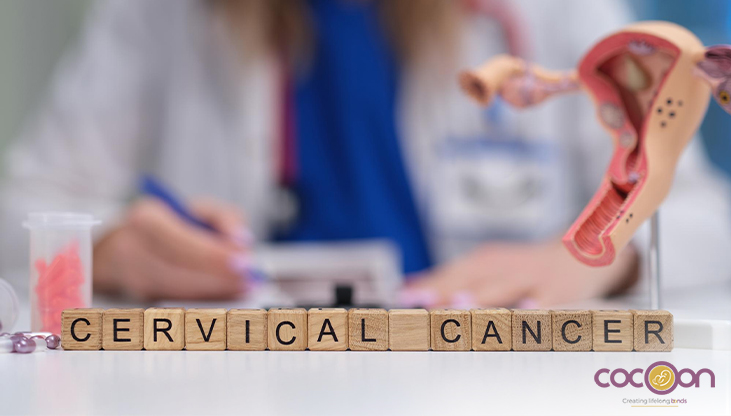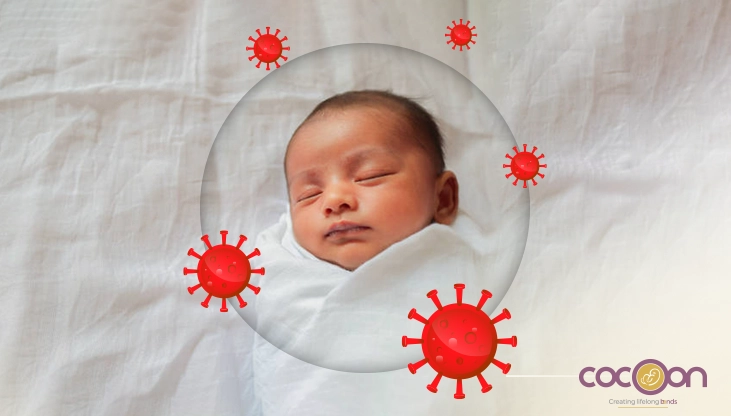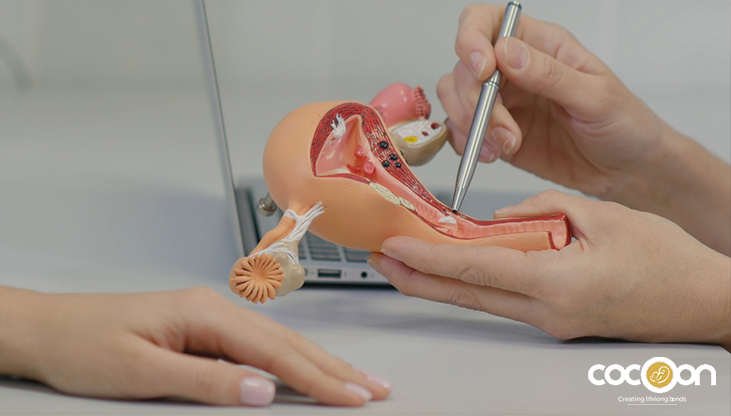Although they are sometimes confused, PCOD (polycystic ovarian disease) and PCOS (polycystic ovarian syndrome) are not the same conditions. PCOD can make it more difficult to conceive and mostly affects the ovaries, resulting in irregular periods and cysts. PCOS, however, is more complicated. It impacts the entire body, but particularly the metabolism, resulting in problems like weight gain, hormonal imbalances, and insulin resistance, a condition in which the body finds it difficult to control blood sugar levels. Although PCOD primarily affects the ovaries, it can also result in a number of symptoms, including acne, undesired hair growth, and increased susceptibility to non-infectious diseases including diabetes and heart disease. Understanding the distinction between the two is crucial for symptom management and lowering long-term health concerns.
Let’s learn more about how PCOD and PCOS differ and how does each condition affect our body?
What is PCOD?
The primary causes of PCOD (polycystic ovarian disease) are hormonal imbalances brought on by stress, illnesses, and certain drugs, as well as hereditary predispositions that develop throughout life. In a normal menstrual cycle, the two ovaries will release mature eggs alternately every twenty eight days. However, PCOD is characterised by ovaries that produce immature or just partially mature eggs, which might become cysts—tiny sacs filled with liquid—in the future.
Furthermore, this results in the swelling and enlargement of ovaries. The ovaries will begin overproducing androgens (male hormones) in this condition, resulting in symptoms such as irregular periods, weight gain around the abdomen, male pattern hair loss, and in severe cases, infertility. During the normal cycle, the ovaries typically release a small quantity of androgens, or male hormones.
While there isn't a definitive "cure" for PCOD, changing your lifestyle is one of the best ways to manage it. Of course, you should do this after speaking with experts, preferably your gynaecologist, endocrinologist, and dietitian. Exercise and a well-balanced diet that is low in sugar and carbs and high in fibre and protein are the best approaches to treat PCOD. Additionally, this prevents some weight gain, which is highly helpful because even a 5% weight decrease makes therapy much simpler.
Depending on the situation, a person may be prescribed medicine to help balance their hormones. Second-line therapies include ovarian drilling, laparoscopic surgery, and aromatase inhibitors might even be required in some cases. However, these are not commonly advised therapies. For the specific treatment of certain symptoms, people may also consult with specific medical professionals. For instance, skin therapies are usually effective in treating PCOD-related acne and hair loss. 20% of cases (based on data collected on Indian women) may require fertility medicines or other treatments to increase fertility in the patients who seek to become pregnant, even if the majority of cases require little aid with conception and result in a smooth pregnancy.
What is PCOS?
Both the conditions PCOD & PCOS have common symptoms, including infertility, weight gain, acne, and irregular periods. Furthermore, PCOS causes metabolic syndrome, which increases the risk of diabetes, heart disease, and strokes. Sleep apnoea, which affects breathing while you sleep, is another possible outcome. The sleep cycle may be seriously disturbed as a result of sudden breathing pauses or complete cessation. Because there is no ovulation, the uterine lining (uterine lining) grows each month, increasing the risk of endometrial cancer.
Oral contraceptives, commonly referred to as birth control tablets, are commonly used to treat PCOS in order to stabilise the menstrual cycle and address a number of other symptoms. Progestin, a hormone that resembles another female hormone, and oestrogen, a female hormone, are both present in these pills. Other medications may be taken to reduce the risk of diabetes and endometrial cancer in addition to treating acne and other skin conditions. A healthier lifestyle and weight loss will contribute to a better prognosis.
What is the Difference Between PCOS & PCOD?
First of all, PCOS is usually thought of as a more serious condition. Simple lifestyle changes can often control PCOD; further medical care may not even be required. However, PCOS is a disease of the endocrine system that may have more serious repercussions. Hormone replacement therapy is the most common treatment for it.
Additionally, PCOD is far more common. While PCOS is not very common, PCOD affects almost one-third of all women who menstruate worldwide. According to a study conducted in Southern India and Maharashtra, 9.13% of menstrual women in those regions had PCOS, whereas 22.5% had PCOD.
Moreover, infertility is a common side effect of both hormonal imbalances, though not to the same extent. As was previously said, if a woman with PCOD takes a few extra steps and gets even little medical care, she can plan to get pregnant. However, a significant number of hormone imbalances brought on by PCOS make conception considerably more challenging. Despite being used to boost fertility by many PCOS patients, the drug clomiphene also raises the risk of twin pregnancy or multiple births.
How can PCOD or PCOS can be Diagnosed?
PCOS and PCOD are often diagnosed using a combination of the patient's medical history, physical examination, blood testing, and ultrasound imaging. The treatment of PCOS and PCOD generally requires a multimodal strategy. To manage your symptoms and improve your insulin sensitivity, you must make lifestyle adjustments, such as managing your weight through diet and exercise. Prescription medications can be used to regulate menstrual periods, reduce testosterone levels, and control insulin resistance. Sometimes infertility treatments are necessary for infertile women. Regular monitoring and follow-up with medical professionals are essential for managing PCOS and PCOD.
Conclusion
Particularly in Indian society, it is tough to ignore the social stigma and misleading information surrounding PCOS and PCOD. Lack of education is always the result of poor communication; most individuals don't even know the most fundamental facts about menstruation. But there's always a chance for improvement. One can stay aware and manage her conditions with the right information.
If you are looking forward to the best gynecological care, then reach out to our gynecologists at Cocoon Hospital. Book your appointment now!
FAQs
Q1: What are the complications associated with PCOD?
A: One's long-term health is at risk due to PCOS, a chronic ailment. It has been associated with uterine cancer, cardiac problems, high blood pressure, high cholesterol, Type 2 diabetes, obesity, sleep apnoea, anxiety, and depression.
Q2: Can women with PCOD plan pregnancy?
A: A woman with PCOD can conceive, but she will likely need to manage her symptoms and maintain a healthy weight.
Q3: Can PCOD turn into PCOS?
A: While PCOD and PCOS are separate conditions, it’s possible for someone with PCOD to develop PCOS if insulin resistance and hormonal imbalances develop over time. However, not everyone with PCOD will develop PCOS.

















